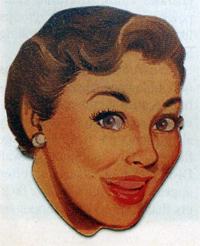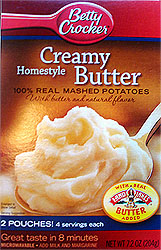The Birth of Betty Crocker
by Andrew Boyd
Today, America's First Lady of Food. The University of Houston's College of Engineering presents this series about the machines that make our civilization run, and the people whose ingenuity created them.
In 1945, at age twenty-four, Fortune magazine named her the second best known woman in the entire United States — right behind Eleanor Roosevelt. Not bad for someone who never really existed.
Betty Crocker was conceived in 1921 in the United States' flour mill capital, Minneapolis. The Washburn Crosby Company — soon to be General Mills — received letters from women that baked with Gold Medal Flour. "How long should I knead [the] dough?" "Why does my cake fall?" The all male advertising department was happy to answer the letters (after consulting with the all female kitchen staff). But the men had a problem. Who should sign the letters?
 Thus was the mythical Betty Crocker born. According to Susan Marks, author of Finding Betty Crocker, the name "Crocker" was taken from a retired and well-liked company director. "Betty" was chosen because "it sounded cheery, wholesome, and folksy."
Thus was the mythical Betty Crocker born. According to Susan Marks, author of Finding Betty Crocker, the name "Crocker" was taken from a retired and well-liked company director. "Betty" was chosen because "it sounded cheery, wholesome, and folksy."
But the advertising department wasn't content to just let Betty sign letters. She struck a chord with "household engineers," the growing ranks of women learning to use the new kitchen gadgetry — like temperature regulated ovens and electric stoves. Betty was a woman just like they were; someone who could listen, empathize, offer help. And, of course, extol the virtues of Gold Medal Flour at every opportunity.
A group of college educated women were hired to develop Betty's persona. Her picture and signature appeared in print ads. Cooking demonstrations were organized showing off Betty's "solutions to domestic woes."
But what cemented Betty's place in history was the novel use of a fledgling technology called radio.
Announcer: It's time for Betty Crocker. And here she is, America's First Lady of Foods. You're a Betty Crocker. Brought to you by General Mills.
Betty Crocker: Hello everybody. Once again it's time for that special visit when we salute all you fine homemakers who are doing so much to make your family happy …
On the radio, Betty could speak to her loyal followers. Cooking and Gold Medal Flour were central to the script. But so were housekeeping, time management, friends, family, and husband s. "If you load a man's stomach with boiled cabbage and greasy fried potatoes," Betty once told listeners, "can you wonder that he wants to start a fight, or go out and commit a crime?" But she also reminded women that their role as homemakers was important, and that their aspirations could be "as great as woman could have in any occupation."
s. "If you load a man's stomach with boiled cabbage and greasy fried potatoes," Betty once told listeners, "can you wonder that he wants to start a fight, or go out and commit a crime?" But she also reminded women that their role as homemakers was important, and that their aspirations could be "as great as woman could have in any occupation."
Today, the name Betty Crocker can be found on a multitude of surprising products, from cake mixes to salad toppings. Her trademark signature, first penned by a company secretary almost a century ago, remains virtually unchanged. Betty's no longer a trusted person so much as she's a trusted brand. But her epitaph is still unwritten. Who knows. We may yet hear from Betty again.
I'm Andy Boyd at the University of Houston, where we're interested in the way inventive minds work.
Much of this episode was based on material from
S. Marks, Finding Betty Crocker: The Secret Life of America's First Lady of Food. New York: Simon and Schuster, 2005.
See also
C. Wurtzer, The Secret Life of Betty Crocker, Minnesota Public Radio, April 7, 2005. From the Minnesota Public Radio web site:
http://news.minnesota.publicradio.org/features/2005/04/07_wurzerc_bettycrocker. Accessed November 4, 2008. The audio clip of Betty Crocker is taken from this site.
General Mills. From the Wikipedia web site: https://en.wikipedia.org/wiki/General_Mills. Accessed November 4, 2008.
Picture by E. A. Boyd.
The Betty Crocker picture is from Creative Commons.